Volume 44, Issue 4
Join Us for the Federal Certification Review Public Meeting on 10/12

DVRPC invites you to attend the Federal Certification Review public meeting on Wednesday, October 12th at 5:30 pm. This meeting welcomes members of the public, partner agencies, and other stakeholders to provide comments to the FTA/FHWA certification review panel regarding DVRPC and its role as the metropolitan planning organization (MPO) for the Greater Philadelphia region.
The MPO is responsible for establishing priorities to meet short-term (next 4 years) and long-term (20+ years) multimodal transportation needs. The public meeting is an important part of the federal review process that is required every four years.
Members of the public are welcome to join this meeting and provide comments either online or in person. Interpretation services and accommodations for individuals with disabilities can be provided to individuals who submit a request at least seven days prior to a public meeting.
DVRPC recommends all in-person meeting attendees and visitors to be vaccinated. If you are feeling sick, do not visit DVRPC’s offices. Masking is optional.
Register to join online or in person.
Road Safety Study on Route 291 Announced
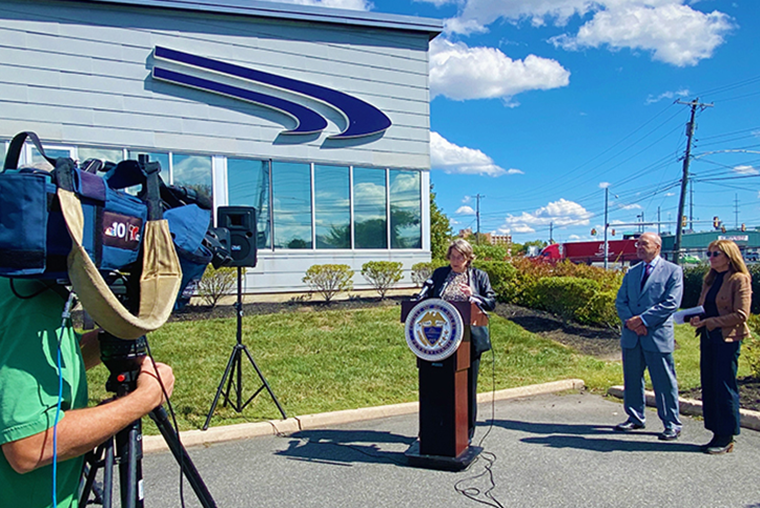
Last month DVRPC and officials from Delaware County held a press conference to announce an award for $150,000 to fund a road safety study on Route 291 from Irving Street in Chester City to Darby Creek in Ridley Township. This regionally significant thoroughfare provides access to residential, commercial, and industrial areas. Its current design leads to multiple hazards for motorists, pedestrians, and bicyclists, and makes it difficult to accommodate the preferred corridor for the East Coast Greenway, a 3,000-mile trail that connects Maine to Florida.
“This project will help us identify a safe and sustainable path forward for residents and visitors who travel on Route 291, whether in vehicles or by foot or bicycle. In addition, this study will help all of the stakeholders understand the options for incorporating the East Coast Greenway into this important corridor,” said Delaware County Council Vice Chair Elaine Paul Schaefer. “Making the road safer, increasing travel options for residents, improving traffic flow, and building green infrastructure will reduce congestion and air pollution–creating a positive impact on both the community and the environment.”
This study is one of 13 projects to receive a total of $1.2 million in funding through the Transportation and Community Development Initiative (TCDI), a grant program that supports smart growth initiatives that improve the multimodal transportation network. View all of this year’s projects. View more photos from the press event on Facebook.
New Municipal Implementation Toolbox
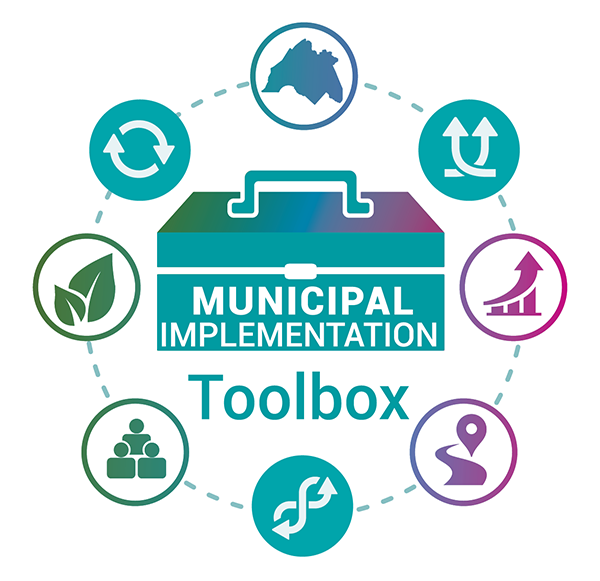
While DVRPC is responsible for long-range planning at the regional scale, implementation of the Plan–and much of our collective future–is based on how the region’s 350 municipalities use their home-rule authority to influence land use, provide public services, protect natural and historic resources, and, ultimately, create the places we call home. To assist municipalities in their work of implementing the goals of Connections 2050: Plan for Greater Philadelphia, DVRPC has released a newly designed Municipal Implementation Toolbox (MIT), which contains resources, case studies, ordinances, and indicators for 75 tools.
This updated and expanded version of the MIT contains new information on native plant ordinances, wireless communications facilities ordinances, internet of things (IoT) and smart communities, suburban retrofits, cooling centers, development without displacement, electric vehicle (EVs) regulations and resources, tactical urbanism and pedestrian plazas, and more. There’s also an updated Local Government Checklist for Preparing for Highly Autonomous Vehicles (HAVs). Find the tools that best fit your municipality’s needs by visiting the MIT and using the interactive filters based on Plan principles and focus areas.
COVID-19’s Impact on Bicycle and Pedestrian Traffic
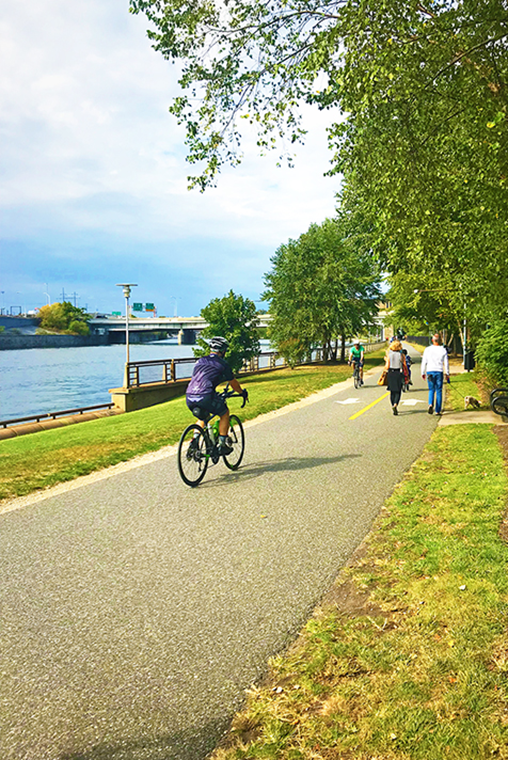
A new analysis examines how the COVID-19 pandemic has affected bicycle and pedestrian traffic in two areas of Philadelphia. Using data collected from the intersection of Front and Chestnut streets and the Schuylkill River Trail near the Walnut Street Bridge, the analysis compares pre-pandemic usage from March 2019 to March 2020, to usage in July 2021 to July 2022, when some residents began to resume normal activities despite COVID-19’s lingering presence.
At Front and Chestnut streets, from April 2022 to June 2022, pedestrian traffic volumes were down 7% from where they were during the same time period in 2019. However, this is a significant uptick from the previous year, 2021, when pedestrian traffic was down by as much as 40%. Along the Schuylkill River Trail, pedestrian traffic returned to pre-pandemic levels in 2022, but bicycle volume was down 34%. This decline may be due to several things, including residual impact of the reconstruction of the Chestnut Street Bridge, which caused this section of the trail to be closed during the first half of 2021, and MLK Drive, which had been closed to motorists since March 2020 and reopened to car traffic in August 2021.
The analysis also examines the activity by time of day in each location. Read the full data bulletin.
Ozone Season Ends, Brought Nine Poor Air Quality Days to Region
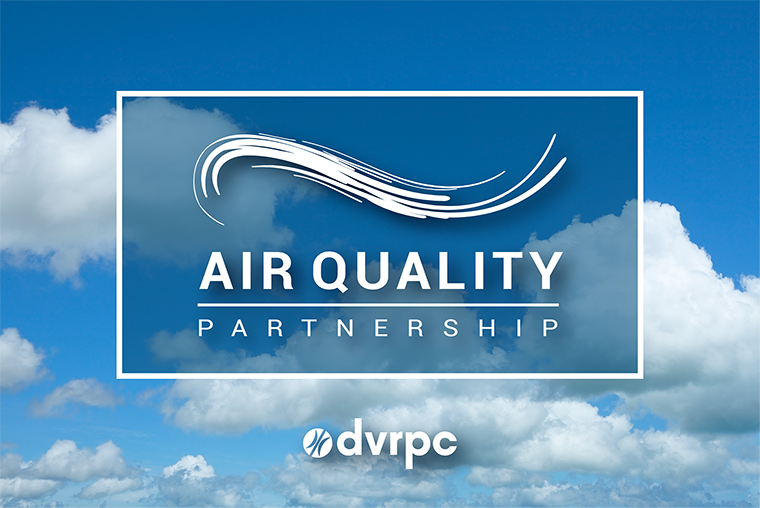
Ozone Season arrives in the Greater Philadelphia region every May and lasts through early September–when the region experiences poor air quality from high levels of ground-level ozone. This pollutant damages healthy lungs, makes people more susceptible to lung infections, and makes it even harder for people with lung disease to breathe. While poor air quality is a risk to everyone, communities of color and low-income communities are disproportionately affected.
During this year’s Ozone Season, the Greater Philadelphia region experienced nine “code orange” air quality days. An orange alert means high-risk groups–including the elderly, children, people with heart and lung conditions, and people who exercise or work outside–should take precautions. Between Ozone Season and particle pollution (PM), the region averages approximately 15 poor air quality days per calendar year. In 2021, there were 16 total poor air quality days.
Everyone can take steps to prevent air pollution and help protect their community’s health. To reduce air pollution, rethink how you travel and try other modes of transportation. Active transportation, like walking or biking, is good for the air and your health. If you must drive, small changes - like combining errands - can make a big impact. Also, consolidating online orders into fewer shipments with slower delivery times can help reduce air pollution. To get more tips, see the daily air quality forecast, and sign up for alerts, visit www.AirQualityPartnership.org.
Southern Area First Responders (SAFR) Celebrate 20 Years
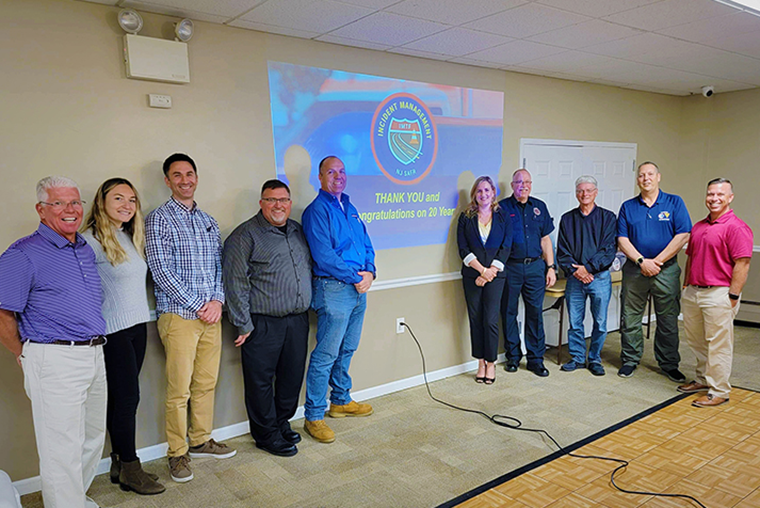
The Southern Area First Responders (SAFR), an Incident Management Task Force (IMTF) administered by DVRPC, celebrated their twentieth anniversary with a special meeting in September. The task force, which was the first of its kind in New Jersey, consists of first responders from response agencies in Camden and Gloucester counties and provides an opportunity for these responders to share knowledge, discuss issues and past experiences, and improve incident management and interagency communication.
Since its founding in 2002, SAFR has made a number of improvements to incident management in the region, including establishing Response Boxes and standardizing response plans. This designates a specific area of highway for each fire department and EMS station to respond to based on highway access rather than municipality. This also lets responders know who will be on the scene. Additionally, the task force has created a Policies and Procedures Manual that has since inspired the creation of a statewide manual, and they supported installation of center median guide rails along the entire length of Route 42 which virtually eliminated cross over crashes.
Over 45 people, including past stakeholders, attended the 20th anniversary meeting. The meeting offered a time to reflect on the successes and greater coordination across agencies that has grown out of these meetings.
SAFR is one of eight IMTFs supported by DVRPC. Learn more about the IMTFs.
Executive Director Barry Seymour Receives APA PA Chapter’s Highest Honor
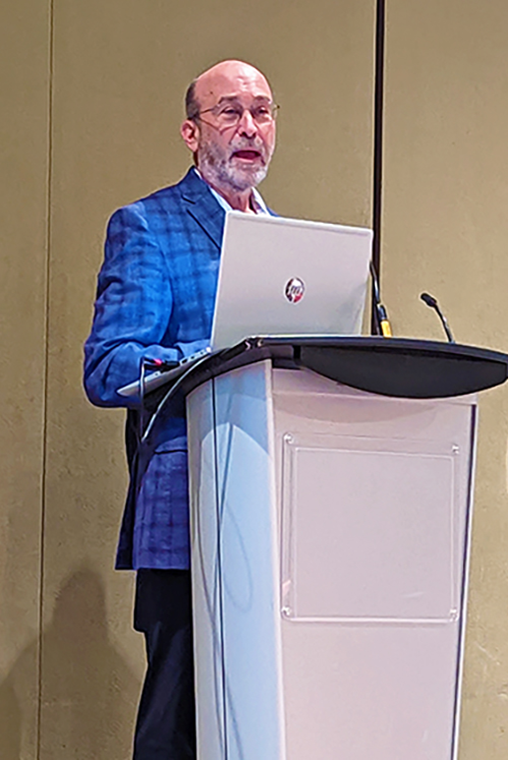
Earlier this month, the American Planning Association (APA) Pennsylvania Chapter recognized DVRPC Executive Director Barry Seymour with a Distinguished Service Award during its annual meeting. The Distinguished Service Award is the Pennsylvania Chapter’s highest honor. It recognizes a Chapter member who contributed to planning in Pennsylvania and the development and mission of the Pennsylvania Chapter in a substantial manner over a sustained period.
Seymour, who will be retiring at the end of 2022, has worked for DVRPC in various leadership roles for the past 32 years and as Executive Director for the last 16 years. During this time, his accomplishments have been many, including launching the Transportation and Community Development Initiative (TCDI) program, which grants funding to municipalities for projects that implement the region’s Long-Range Plan; securing funding to create a Regional Trails Program administered by DVRPC; and prioritizing work in diversity, equity, and inclusion.
Throughout his career, Seymour has proven to be a conscientious professional and leader who generously shares his time and knowledge; actively engages with staff, peers, and the community; and supports local planning and training for emerging planners.
Arterial Typology and Speed Management Decision-Making Framework for the City of Philadelphia
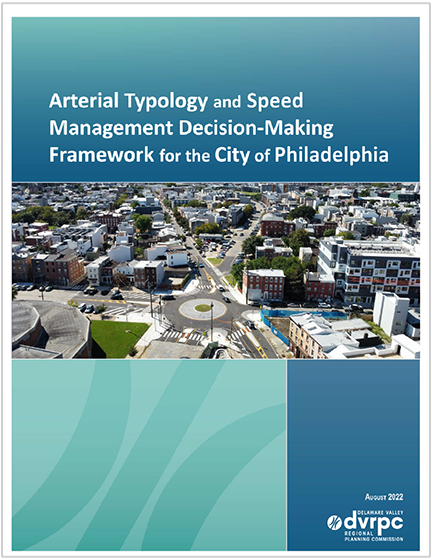
A new DVRPC study has developed typologies to aid with identifying speed management strategies for the City of Philadelphia’s arterial road network. Using data-driven analyses, “Arterial Typology and Speed Management Decision-Making Framework for the City of Philadelphia” redefines Philadelphia’s arterial roads with new typologies that more accurately reflect the City’s unique characteristics to allow scaled traffic calming per typology.
The study identifies four categories of arterials based on factors like road width, traffic volume, and adjacent land use, and examines a range of traffic-calming and speed management tools for each category. This timely study provides guidance for PennDOT and the City of Philadelphia for calming traffic on the busiest roads in the city and supports the City’s Vision Zero goal of eliminating deaths and serious injuries from crashes on city streets. Access the report.
Upcoming Online LTAP Classes in PA and NJ

The Local Technical Assistance Program (LTAP) provides technical information and expertise to help municipal governments use transportation funds more effectively, improve road maintenance, and increase roadway safety. Classes are held by Pennsylvania and New Jersey LTAP programs, but are open to any municipality.
Upcoming classes:
Roadway and Safety Improvement Program
Virtual
October 13, 2022 (8:30 am - 12:30 pm)
Winter Maintenance
Virtual
November 1, 2022 (8:00 am - 12:00 pm)
Visit Rutgers Center for Advanced Infrastructure and Transportation to see the 2022 schedule of LTAP courses in New Jersey.
Visit PennDOT's LTAP website to view the course descriptions and register. For any questions, contact Linda McNeffer at lmcneffer@dvrpc.org or 215-238-2872.
DVRPC maintains a calendar of events, workshops, and conferences hosted by our partners and related to planning for Greater Philadelphia. Visit our Partner Calendar to learn more.
Staff Profile: Vanessa Doan, Director of Finance

What did you want to be growing up? I had many happy memories of different teachers that impacted my life and so when growing up, I thought about being a teacher but going into high school really changed that point of view knowing that kids can be a handful. Now I am stuck with two kids at home!
What was your first job? I had various summer jobs including working in a muffin factory where I could eat fresh blueberries muffins every day and gained many pounds.
What did you study in college? I attended Chestnut Hill College which is located in Germantown for the Bachelor of Science in Accounting and Saint Joseph University for Master of Finance.
How did you end up at DVRPC? This is a long story–after I graduated from Chestnut Hill, I got an accountant staff position at PEP BOYS but I didn’t really like the job functions and I quit after working there for one week. Then, I applied for various jobs on Monster.com–this was 20 years ago before Indeed.com–and landed a job at DVRPC; however, after working at DVRPC for 3 years, I wanted to pursue CPA and went into public accounting and audit with other firms. I’m excited to have come back to DVRPC, and the Commission has offered me many opportunities to learn, grow, and contribute.
What is your favorite part of working at DVRPC? People, culture, support
If you were Monarch for a day, how would you improve the region? I’ll leave this to the planners.
What is your work/life philosophy? Work smart and have fun at the same time.
What is something colleagues don’t know about you? I speak 3 languages.
What is your favorite leisure activity? Watching movies
What is your recent obsession? Gardening and baking
What is the last book you read? Or, what is the best music you’ve heard recently? Lots of kids books–I have to read to my 9 year old! I love pop music–songs from Adele, John Legend, Sam Smith, Ellie Goulding, etc.
What are your Top 3 places you want to travel to? Alaska, Australia, and Ireland
Are you a cat or dog person? I used to have 5 cats and 1 dog. So, both.
What is a recent gift you’ve given or received? Received flowers for my 18th wedding anniversary but that’s it. I told my husband that he didn’t have to get me a gift and he actually listened to me for the first time.
What is the most meaningful item in your house? The Refrigerator! We need food!
What are you looking forward to the most post-pandemic? Getting back together for simple gathering and dinner and more travel.